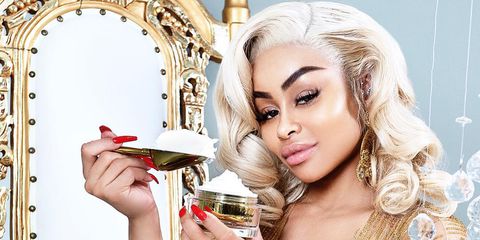Blac Chyna has recently been under fire for endorsing a skin lightening product called ‘Whitenicious’ and launching it in Nigeria, as a collaboration with Denecia, a pop star from Cameroon. Whitenicious is marketed as a luxury product, sold at approximately £194 per Swarovski-lined jar, and has been said to not bleach skin, but simply moisturise and lighten the tone. So, what is the problem?
There exists paradoxical narratives about self-love, where sellers insist that as long as buyers make their own purchasing decision, we can all overlook the underlying issues. But, Whitenicious is not even subtle about what they are selling. The Eurocentric beauty standards still dominate the world today, with those with European features much more represented and praised than those without. The ‘White’ in Whitenicious blatantly supports this, synonymising whiteness to beauty, while selling to communities of colour. Racism perpetuated by white people may be obvious and apparent, but what this case brings to light is the deep-rooted issue of colourism within communities of colour themselves. Colourism is an issue that affects millions everyday. Skin lightening advertisements are displayed on television, magazines and billboards, where actresses’ lives are made to turn from grey to pastel bright after using skin lightening creams. Adverts use anecdotes such as showing an actress not being desirable until the cream helps them ‘achieve’ a fairer skin. These are ubiquitously shown in Lagos, Korea, Japan and multiple other countries with a high population of colour.
It appears that women of colour are only acceptable if they show close proximity to European beauty standards.
As a fair-skinned Southeast Asian woman, I witnessed the effects of colourism first-hand at a young age. My friends would compliment my skin tone and wish theirs was lighter. Darker complexions would continuously be the punchline of a joke. Internalised colourism is also statistically evident. According to World Health Organization (WHO), 77% of people use skin bleaching products in Nigeria, the exact country Whitenicious is promoted in. Sales of skin lightening creams are also high in Asia-Pacific regions, such as India, where colourism issues are also rooted in the view that fairer skin correlates to higher caste. Bans have been put on skin lightening ads and products. Experts have spoken about the creams’ potential health issues, as many contain strong chemicals such as hydroquinone, but sales rocket anyway. There is a widespread view that fair skin correlates with higher chances in both dating and getting jobs. Sadly, it is true. Statistics show that light-skinned Latinos earn $5,000 more than those with darker complexions. Another observation by the BBC shows that while there are 17 black female artists in the recent British Top 40, the majority of them are light-skinned. There are even multiple interviews where black men express their preference to date light-skinned women and dismissed dark-skinned ones, despite being black themselves. It appears that women of colour are only acceptable if they show close proximity to European beauty standards. Unfortunately, this view is perpetuated even within their own communities, by their own Blac Chynas and Denecias.
Colourism affects the self-esteem of millions and it transcends the individual, into how people are treated in the outside world. Sure, we have darker skinned representatives in the media, but to truly achieve self-acceptance and self-love, we have a long way to go. To capitalise off of colourism and the insecurities that come with it, especially as an influential person of colour, is deeply irresponsible.
Yasmine Zahra

